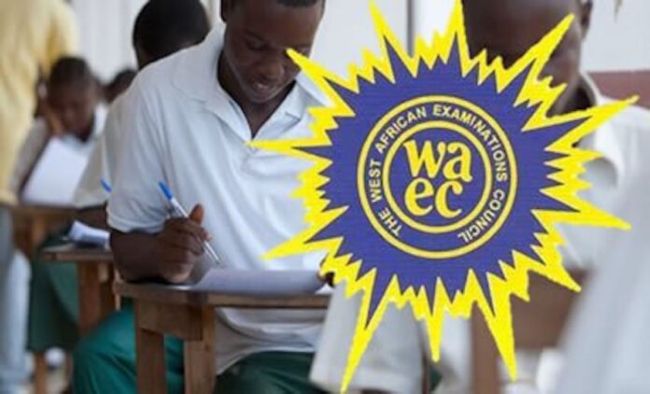Exam Integrity in Crisis: WAEC Withholds 192,000 WASSCE Results Over Cheating

The West African Examinations Council (WAEC) has released the results of the 2025 West African Senior School Certificate Examination (WASSCE) for school candidates in Nigeria, while sounding the alarm over rising incidents of examination malpractice, particularly the use of mobile phones and organised cheating in schools.
At a press briefing in Lagos, Dr. Amos Dangut, Head of the Nigeria National Office of WAEC, revealed that 192,089 results—representing 9.75% of the total candidates—have been withheld pending investigations, citing violations ranging from impersonation and collusion to digital cheating.
Although this figure marks a modest improvement compared to 2024’s 11.92%, WAEC emphasized that the systemic integrity of Nigeria’s secondary education system remains at risk.
“There’s a growing culture of organised malpractice, and this must be addressed collectively by schools, teachers, parents, and regulators,” Dangut warned.
Key Highlights: Breakdown of 2025 WASSCE Results
- Total Registered Candidates: 1,973,365
- Candidates Who Sat the Exam: 1,969,313
- Fully Released Results: 1,517,517 (77.06%)
- Results Still Being Processed: 451,796 (22.94%)
- Results Withheld Over Malpractice: 192,089 (9.75%)
- Candidates With 5 Credits & Above (English & Maths inclusive): 754,545 (38.32%)
- Overall Pass Rate (5 Credits in any subjects): 1,718,090 (87.24%)
- Gender Distribution: 976,787 males (49.6%) and 992,526 females (50.4%)
In a worrying trend, this year’s performance in core subjects—English Language and Mathematics—declined by 33.8% compared to 2024, with less than 4 in 10 candidates meeting the basic requirement for admission into tertiary institutions.
Digital Access and Constraints: A Mixed Bag
WAEC confirmed that WASSCE Results are now available via www.waecdirect.org, and candidates can access them using the smart identity card PIN issued during the examination.
- Digital certificates will be available within 48 hours of result access.
- Physical certificates are expected to be ready within 90 days.
- However, candidates whose fees were subsidised by defaulting state governments will be unable to access their results until the debts are settled.
“We appeal to state governments with outstanding obligations to settle their dues promptly. These students should not be punished for administrative lapses,” Dangut said.
Special Needs and Inclusivity: Progress in Access
WAEC also reported a commendable increase in inclusivity and special needs support during this year’s exams:
- 12,178 special needs candidates were registered
- 112 visually challenged, 615 with hearing impairments, 52 mentally challenged, and 37 physically challenged candidates participated
- Their results were processed and released alongside others, reinforcing WAEC’s commitment to equal access and accommodation in assessments
BRANDECONOMY INSIGHT: The Integrity Crisis in Nigeria’s Exam Ecosystem
While WAEC’s digital transformation and inclusion strides are commendable, the real threat to Nigeria’s secondary education system lies in the erosion of academic integrity. The increasing sophistication of exam malpractice, particularly the use of smartphones and “exam syndicates” in some schools, points to a commercialisation of cheating that undermines genuine learning outcomes.
As Nigeria seeks to transition to a knowledge-based economy, academic fraud represents a silent threat—producing ill-prepared graduates, eroding public trust in certification, and weakening the pipeline of talent to higher education and the workforce.
The Road Ahead: Five Strategic Imperatives
To restore confidence and credibility in the WASSCE system, stakeholders must act decisively:
- Enforce Tech-Safe Zones in Exam Centres: Strict control of digital devices during exams using scanners and mobile jammers
- Invest in AI-Enabled Proctoring: Adopt surveillance and data analytics tools to monitor irregularities in real time
- Decentralise WAEC Monitoring Teams: Empower independent watchdog units to oversee high-risk centres
- Reform Exam Centre Accreditation: Hold schools accountable and revoke licences of centres found complicit
- Public Accountability & Reporting Mechanism: Introduce whistleblower protection for teachers and students who report malpractice
Final Word: Results Are Out—But Is the System Winning?
While over 1.5 million students have successfully received their results, the question that looms large is not just “who passed?” but “what did they learn, and at what cost?”
Unless Nigeria’s education stakeholders confront the malpractice epidemic head-on, even record-breaking enrolment and digital upgrades may do little to ensure that credentials reflect competence.











